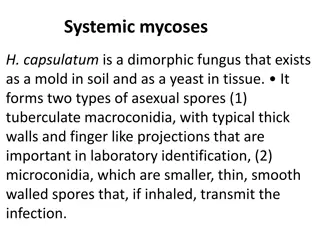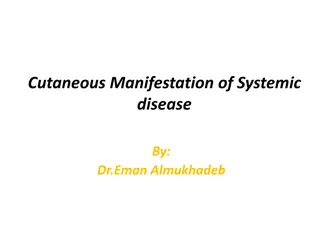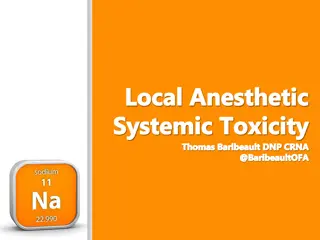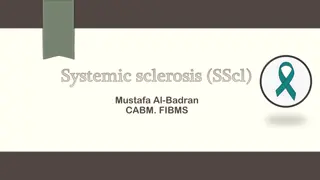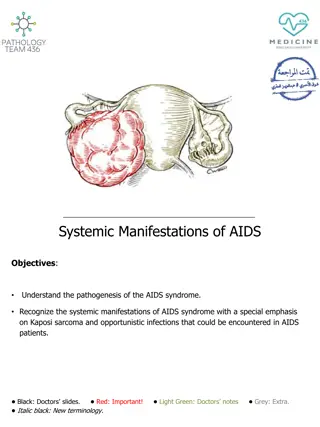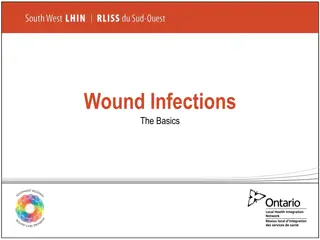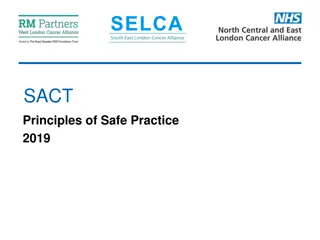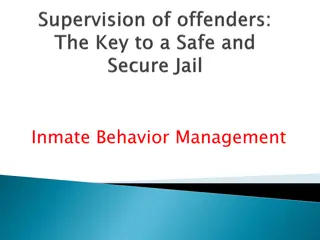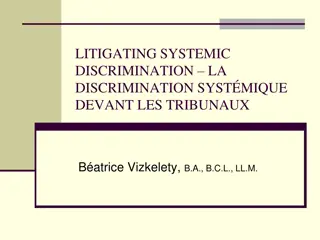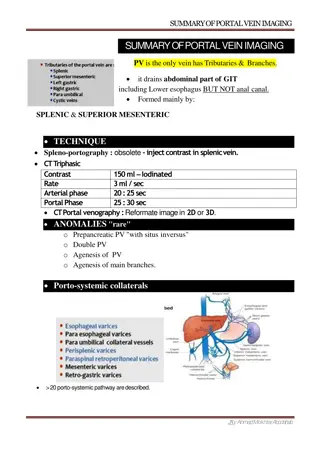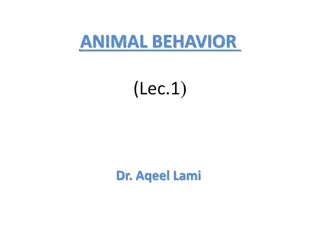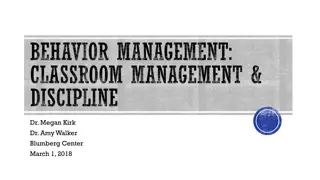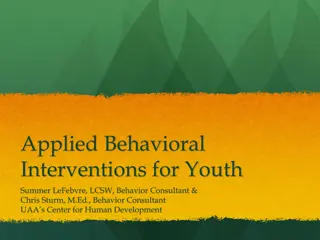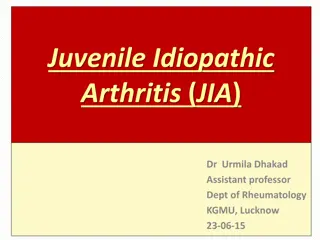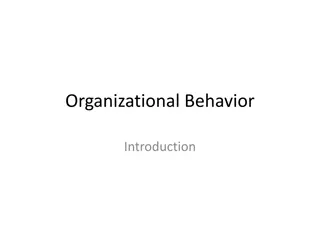Function Based Thinking
Function-based thinking in Missouri Schoolwide Positive Behavior Support, emphasizing data-based decision-making, mission clarity, and effective teaching practices. Understand how behavior is related to the environment and how environmental interventions play a key role in shaping expected behaviors
6 views • 27 slides
Addressing Predatory Behavior in the Fellowship
Predatory behavior, especially towards vulnerable members, is a concerning issue in the fellowship. This behavior includes unwelcome advances, exploitation of power dynamics, and institutional sexism. The discussion on predatory behavior necessitates honest dialogue and a united approach for a safer
3 views • 13 slides
Prevalence of KIT D816V Mutation in Patients with Systemic Mast Cell Activation
This study presents findings from the PROSPECTOR clinical trial on the prevalence of the KIT D816V mutation in the peripheral blood of patients with systemic mast cell activation. The study involves multiple centers globally and sheds light on the significance of this mutation in systemic mastocytos
5 views • 14 slides
Systemic mycoses
Systemic mycoses are fungal infections caused by dimorphic fungi such as Histoplasma capsulatum, Blastomyces dermatitidis, and Cryptococcus neoformans. Histoplasmosis is transmitted through inhalation of spores from soil or bat-infested caves, presenting with tuberculate macroconidia and microconidi
4 views • 9 slides
Cutaneous Manifestations of Systemic Diseases: Endocrine Disorders and Diabetes Mellitus
Explore the cutaneous manifestations of systemic diseases, particularly focusing on endocrine disorders like diabetes mellitus. Learn about the dermatologic signs associated with conditions such as hypothyroidism, hyperthyroidism, Addison's disease, and Cushing syndrome. Discover specific manifestat
0 views • 88 slides
Understanding Systemic Functional Linguistics in Contemporary Language Studies
Explore the role of language in everyday life, the principles of Systemic Functional Linguistics, and the application of discourse analysis in translation. Delve into the Hallidayan model of language and discourse, examining genre, register, sociocultural environment, and more.
0 views • 20 slides
Understanding the Challenges of Racism and White Fragility in Community Collaboration
Explore the complexities of racism, systemic issues, and white fragility in community engagement and research collaborations. Delve into the importance of acknowledging white privilege and understanding systemic racism, focusing on the need for white individuals to actively participate in conversati
5 views • 13 slides
Reflecting on Racism: Personal Stories and Societal Reflections
Explore diverse perspectives on racism and racial disparities through personal narratives and societal observations. Engage in conversations about identity, cultural heritage, and confronting biases. Witness the impact of historical patterns and systemic injustices on individuals and communities, wi
0 views • 22 slides
Understanding Local Anesthetic Systemic Toxicity in Anesthesia Practice
Local anesthetics are crucial in anesthesia for their ability to prevent nerve depolarization, but systemic toxicity can lead to serious complications. Last Causes, signs, and max dosage discussion along with the importance of recognizing early signs like lightheadedness, tinnitus, and late symptoms
0 views • 19 slides
Understanding Fungi Diversity and Infections in Microbiology
Explore the world of fungi and fungal infections in this foundation block of microbiology. Learn about medically important yeasts, mold fungi, major fungal diseases, antifungal agents, and infection acquisition methods. Dive into hypersensitivity reactions, mycotoxicoses, and various types of fungal
1 views • 19 slides
2020 Disparity Study: An Exploration of Systemic Discrimination in Business Practices
The 2020 Disparity Study, presented by Mr. Kevin Williams and Ms. Betsy Sava from BBC, delves into the investigation of systemic discrimination in business practices. The study combines statistical evidence with anecdotal research to highlight disparities and barriers faced by minority-owned busines
0 views • 12 slides
Understanding Systemic Sclerosis: Causes, Symptoms, and Management
Systemic sclerosis (SScl) is an autoimmune disorder affecting connective tissue, leading to fibrosis in the skin, internal organs, and vasculature. It is characterized by Raynaud's phenomenon, digital ischemia, sclerodactyly, and cardiac, lung, gut, and renal involvement. Peak onset is in the fourth
1 views • 28 slides
Understanding Consumer Behavior in Marketing
The design of a marketing program starts with understanding consumer behavior. Consumers, as the end users, play a crucial role in shaping market trends. Producers seek insights into consumer personas, market behaviors, and influencing factors. Management focuses on the consequences of consumer beha
2 views • 26 slides
Systemic Inequalities Faced by Immigrant Communities in Greater Manchester
Gain insight into the systemic inequalities faced by immigrant communities in Greater Manchester, including definitions of refugees and asylum seekers, a snapshot of refugee and migrant communities in Manchester, the Iranian diaspora in the UK, global migrant statistics, and common health issues fac
0 views • 10 slides
Understanding Psychology: The Science of Behavior and Mental Processes
Psychology is the scientific study of behavior and mental processes. Psychologists study both observable behavior and private mental processes. The primary goals of psychology are to describe, understand, predict, and control behavior. Different branches of psychology, such as applied psychology, cl
2 views • 29 slides
Understanding Systemic Manifestations of AIDS
Human Immunodeficiency Virus (HIV) is a retrovirus causing Acquired Immunodeficiency Syndrome (AIDS). HIV leads to immune system destruction, making individuals vulnerable to opportunistic infections and tumors. Common sexually transmitted diseases like syphilis, chlamydia, and gonorrhea are discuss
6 views • 15 slides
Understanding Wound Infections: A Comprehensive Overview
Explore the various stages of wound infections on a continuum from contamination to systemic infection. Learn how to identify and manage each stage, from presence of microbes to invasion of surrounding tissues. Discover the subtle signs of local and spreading infections, and the serious implications
1 views • 30 slides
Safe Practice Principles for Systemic Anti-Cancer Therapy (SACT) 2019
Systemic Anti-Cancer Therapy (SACT) involves chemotherapy and targeted agents for cancer treatment. Risks include errors with non-accredited staff, incomplete prescriptions, incorrect dosing, and patient education deficiencies. Safe practice principles emphasize specialist care, established protocol
0 views • 25 slides
Reflections on Financial Regulation Over the Past Decade
Assessing the decade of financial regulation reveals improvements in bank capitalization and systemic risk management. However, challenges remain with sovereign debt levels, low interest rates, and political support for further reforms. The discussion also looks ahead to potential future crises orig
0 views • 13 slides
Understanding Inmate Behavior Management in Correctional Settings
Inmate Behavior Management in correctional facilities involves supervising inmates, implementing corrective discipline, and fostering a fair and consistent environment. It emphasizes the importance of behavior management plans, identifying undesirable traits in supervision, and passing educational a
0 views • 19 slides
Understanding Human Behavior: Foundations and Factors
Human behavior is a multifaceted subject influenced by genetic makeup, culture, and individual values. It encompasses both overt actions and covert thoughts, a product of the individual and environmental factors. Psychologists study behavior from visible (overt) actions like playing football to inne
0 views • 20 slides
Understanding Normal and Abnormal Behavior: Perspectives and Definitions
Normal behavior varies from person to person and society, influenced by individual preferences and societal norms. Abnormal behavior is characterized by an inability to function effectively or personal discomfort. The concept of normality and abnormality in psychology raises complex questions about
2 views • 8 slides
Fighting Systemic Discrimination Through Litigation: A Legal Perspective
This content delves into the crucial role of litigation in combatting systemic discrimination, particularly in the context of under-representation of women in male-dominated work environments. It emphasizes the need for multiple strategies, including legal action, to address discriminatory barriers
0 views • 15 slides
Oral Manifestations of Systemic Diseases in Dentistry
This content explores various systemic diseases and their oral manifestations relevant to dentistry. It covers associations between heart disease and periodontal disease, effects of chronic corticosteroid use on the pulmonary system, endocrine disorders like diabetes and thyroid issues, autoimmune d
1 views • 63 slides
Understanding Human Behavior: Insights for Social Workers
This material delves into the intricacies of human behavior, exploring factors influencing behavior such as heredity, environment, intelligence, needs, and motives. It covers the concept of human behavior, stages in life from conception to old age, and theories of human development by eminent psycho
2 views • 71 slides
Portal Vein Imaging Techniques and Anomalies Overview
Portal vein imaging is crucial for evaluating conditions affecting the abdominal part of the gastrointestinal tract. Techniques such as spleno-portography and CT triphasic contrast imaging are used to visualize the portal vein and diagnose anomalies like portal-systemic collaterals and porto-systemi
4 views • 7 slides
Understanding the Connection Between Oral Health and Systemic Diseases
The relationship between oral health and systemic diseases is significant, with manifestations within the oral cavity providing clues to underlying systemic issues. Disease processes involve aspects like etiology, pathogenesis, morphologic changes, and clinical significance. Organisms and toxins spr
0 views • 19 slides
Understanding Animal Behavior and Ecology
Animal behavior encompasses a range of activities such as feeding, breeding, and social interactions. Ethology focuses on studying behavior in natural environments, while behavioral ecology examines ecological aspects like predator-prey interactions. Sociobiology delves into the evolution of social
3 views • 5 slides
Analyzing Systemic Climate Risk in the Financial Sector
This study discusses systemic climate risk in the financial sector by examining the effects of climate risks on financial institutions. It aims to design a market-based framework to assess the vulnerability of financial institutions to climate risks and analyze potential contagion effects. The frame
0 views • 39 slides
Understanding Behavior Management in Classroom Settings
Explore the essential topics of behavior management, classroom strategies, and discipline in educational settings. Delve into the functions of behavior, impact of trauma on learning, and effective management techniques. Learn how to identify underlying reasons for student behaviors, discuss behavior
0 views • 76 slides
Targeting Emotions to Facilitate Behavior Change in Older Adults
Efforts in changing health behavior have traditionally focused on social and cognitive factors, but recent evidence highlights the importance of affective states in decision-making and behavior change. Janey Peterson discusses the role of emotions in achieving and sustaining behavior change to benef
0 views • 11 slides
Grading Criteria for Effort and Behavior in Educational Reporting
Effort and behavior in educational settings are evaluated based on criteria ranging from Excellent to Causing Concern. Pupils demonstrating excellent behavior show respect, responsibility, and positive engagement in learning. Those with good behavior exhibit cooperation and respect for others, albei
0 views • 9 slides
Understanding Applied Behavior Analysis (ABA) for Youth Interventions
Applied Behavior Analysis (ABA) is a science focusing on improving human behavior by increasing desired behaviors, teaching new skills, and generalizing behaviors. ABA emphasizes observable behaviors, measurement of behavior change, and the use of interventions in various settings like classrooms an
0 views • 25 slides
PBIS Expectations and Behavior Flowchart
The PBIS flowchart outlines behavior expectations and interventions for minor and major incidents in a school setting. It covers disrespectful behavior, disruption, defiance, property damage, theft, possession of weapons, and more. The flowchart guides teachers and staff on managing and addressing s
0 views • 6 slides
Managing Acting-Out Behavior: A Staff Development Program Review
This review discusses a staff development program created by Geoffrey Colvin, Ph.D., from the University of Oregon, focusing on preventing and managing acting-out behavior in students with emotional disturbance or behavior disorders. The program includes video presentations, strategies for behavior
0 views • 22 slides
Empowering Change: The Systemic Approach to Addressing Social Injustice
Explore the systemic change approach to combating unjust structures that oppress individuals living in poverty. Delve into understanding systems as interconnected wholes and the significance of systemic thinking in driving transformation. Uncover the complexities of social systems and the need to ac
0 views • 20 slides
Understanding Juvenile Idiopathic Arthritis (JIA) and Systemic Onset JIA (SOJIA)
Juvenile Idiopathic Arthritis (JIA) is arthritis of unknown origin that starts before the 16th birthday and lasts at least 6 weeks. It was previously known as juvenile rheumatoid arthritis (JRA). The diagnosis of JIA requires meeting specific criteria, and it can be classified into various subtypes
0 views • 52 slides
Understanding Organizational Behavior and Individual Behavior
Organizational Behavior (OB) is a multidisciplinary field that combines knowledge from various disciplines to study and manage organizations effectively. It emphasizes the application of this knowledge to enhance organizational effectiveness and the well-being of participants. OB is a useful concept
0 views • 38 slides
Function-Based Behavior Support Plans: A Comprehensive Guide
Explore the process of developing Function-Based Behavior Support Plans (BSP) using Functional Behavioral Assessment (FBA). Understand the concepts of function and functional behavior assessment, learn how FBA/BSP fits within a multi-tiered support system, and practice developing BSP for students. D
0 views • 74 slides
Accelerating Systemic Change Network Inaugural Workshop Overview
The Accelerating Systemic Change Network (ASCN) held its inaugural workshop in July 2016 at the Howard Hughes Medical Institute. The event focused on introducing ASCN, its goals, and working group topics to facilitate collaboration among change researchers in higher education. ASCN aims to be a prof
0 views • 22 slides



